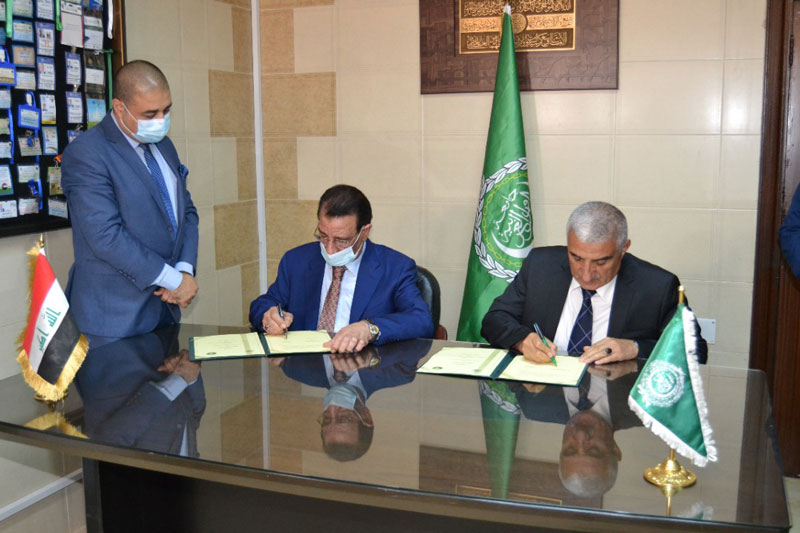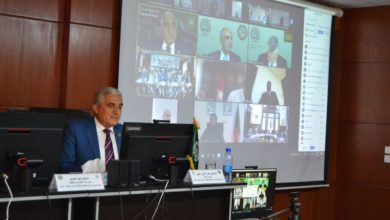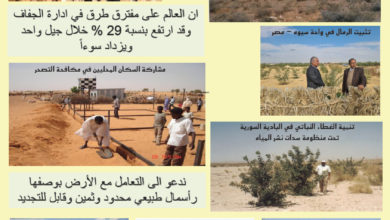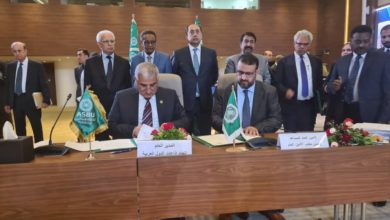An agreement signing between the Iraqi Ministry of Agriculture and the Arab Center ACSAD
To develop the relations between the Iraqi Ministry of Agriculture and the Arab Center for the Studies of Arid Zones and Dryland ACSAD, during the visit done by his Excellency the Minister of Agriculture in the Republic of Iraq, Eng. Muhammad Karim Al-Khafaji for the Arab Center for the Studies of Arid Zones and Dryland ACSAD, and after the discussions conducting with his Excellency Dr. Nasr Edin Obaid, the Director-General of the Arab Center ACSAD; listening to the presentations, research and studies results presented by several Syrian and Arab experts and researchers on the plant, water, and land resources, water uses, and livestock; and with the aim of benefiting from distinguished expertise of ACSAD in these fields and others; the Ministry of Agriculture in the Republic of Iraq and the Arab Center for the Studies of Arid Zones and Dryland ACSAD have signed a technical and substantive cooperation convention 2021 – 2022, to develop and improve the cooperation between both sides in the different fields of the agricultural sector and sustainable development in the brotherly Republic of Iraq.
The Convention is signed by his Excellency, the Iraqi Minister of Agriculture Eng. Muhammad Karim Al-Khafaji and his Excellency, Dr. Nasr Edin Obaid, the Director-General of the Arab Center for the Studies of Arid Zones and Dryland, at ACSAD’s headquarter today.
The Convention developed for ACSAD includes preparing the maps specializing in the cover plant changes, sending 250000 rooted seedlings of high-oil olive varieties, and providing ACSAD’s expertise in developing and improving Palms in Iraq, tissue culture, and service processes to improve production qualitatively and quantitatively.
The Convention is also developed to organize a number of training courses in the fields of the breeding olive tree, biodiversity, plant wealth utilization and preservation methods, plant genotypes, the importance of collecting them from their natural resources and its preservation methods, and the development and administration of the plant gene bank.
The Convention also includes growing, improving, and producing crops resilient to drought and salinity, biotechnologies to determine varieties and biodiversity of the plant, the plant fibers and their role in the industrial sector, in addition to the modern methods in plant growing and improvement, aquaculture (hydroponic) in crops production.
In forest rehabilitation, the Convention includes establishing a gene bank for palm varieties in Iraq, participating in the national courses on palm cultivation development in desert lands. The continuation of the Arab Centre for the Studies of Arid Zones and Dryland by supplying the Iraqi Ministry of Agriculture with strains derived from wheat and barley’s varieties resilient to dry areas through the breeding program implementing by ACSAD; and examine these new varieties under the local environmental conditions in Iraq within the productivity efficiency experiments that have been implementing by ACSAD.
The Convention provides for the supply of the Iraqi Agriculture Ministry with seeds of pastoral species by ACSAD. Each variety with available quantities in its research stations. The supply of the agriculture Ministry with seeds of trees resilient to harsh environments, constantly. The cooperation in the field of the studies, research, and applications of medicinal and aromatic plants.
In livestock, it has been agreed to re-activate the cooperation in the “Awassi sheep by selection” project. Furthermore, the inclusion of Iraq within the cooperating state’s group in the improvement goats project in the Arab countries and the continuation of the supply of Iraq with improved genetic resources by some 50 rams of Awassi sheep and 50 males Shami goats; with the addition of semen straws numbers of improved Awassi sheep and Shami goats every year; conducting a training course on the sheep and goats artificial insemination, and processing the agriculture waste as forage.
In water resources, it has been agreed upon organizing a training course in poor and saltwater uses in agricultural irrigation and rainwater harvesting technologies.
In monitoring desertification and rehabilitating desertified areas, it has been agreed upon providing Iraq with satellite imagery and archiving the required maps, organizing several training courses in remote sensing and geographical information systems GIS, transferring biogas production techniques from the animal residue, climate changes, and achieving sustainable development.
The Convention also provides upon the supply of the Arab Center with the initial studies of several projects by the Iraqi Agricultural Ministry, so the Center for the Studies of Arid Zones and Dryland would be able to prepare them in its final version; for presentation to financial donating institutions and funds to restoring degraded palm areas, dunes fixation, restoring the natural plant cover. In addition to providing the technical expertise in field surveys in Iraq, preparing a database, and preparing land degradation map in Iraq, selecting a pilot region to implement combating desertification project.
It also provides upon the Arab Center ACSAD to invite the Iraqi side for all Arab courses and workshops organized by the Arab Center ACSAD to develop the agricultural sector at both plant and animal levels. The implementation of training courses in the Republic of Iraq or at the Arab Center’s headquarters as the two sides agreed; providing the agriculture ministry with the issues and studies prepared by the Arab Center to take advantage of it by researchers and interested in this field.




